 Go to A-Z Databases: Books & eBooks to search for more eBooks. Must be on campus or login with your COM account for off campus access.
Go to A-Z Databases: Books & eBooks to search for more eBooks. Must be on campus or login with your COM account for off campus access.
Want more on finding books or eBooks? Try our How to Use Books & eBooks guides.
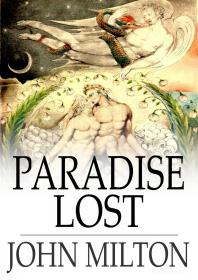 Paradise Lost
by
John Milton
Paradise Lost is one of the most epic, complex theological works to date. Milton's masterpiece in blank verse tells the story of the fall from grace. His protagonist is often read as Satan, who rebels against the omnipotent God, though he cannot win. Milton expresses the paradox of free will within the creation of an all-knowing God.
Paradise Lost
by
John Milton
Paradise Lost is one of the most epic, complex theological works to date. Milton's masterpiece in blank verse tells the story of the fall from grace. His protagonist is often read as Satan, who rebels against the omnipotent God, though he cannot win. Milton expresses the paradox of free will within the creation of an all-knowing God.
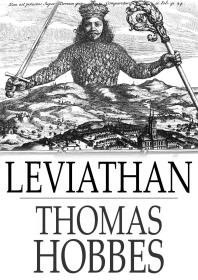 Leviathan
by
Thomas Hobbes
Thomas Hobbes' Leviathan, from 1651, is one of the first and most influential arguments towards social contract. Written in the midst of the English Civil War, it concerns the structure of government and society and argues for strong central governance and the rule of an absolute sovereign as the way to avoid civil war and chaos.
Leviathan
by
Thomas Hobbes
Thomas Hobbes' Leviathan, from 1651, is one of the first and most influential arguments towards social contract. Written in the midst of the English Civil War, it concerns the structure of government and society and argues for strong central governance and the rule of an absolute sovereign as the way to avoid civil war and chaos.
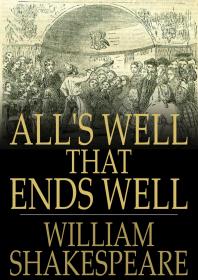 All's Well That Ends Well
by
William Shakespeare
Although originally classified as one of Shakespeare's comedies, All's Well That Ends Well" is now more commonly classified as one of his ambiguous problem plays, so called because they defy neat classification as either comedy or tragedy. Helena, a servant harbors a secret love for Betram her mistresses' son. When the king becomes ill Helena promises to heal him if she is allowed to marry any man of her choosing. Helena's father is a renowned physician and the young girl having inherited his knowledge saves the king and Bertram is chosen as her husband. The one sided affair soon blossoms into requited love and all's well that ends well.
All's Well That Ends Well
by
William Shakespeare
Although originally classified as one of Shakespeare's comedies, All's Well That Ends Well" is now more commonly classified as one of his ambiguous problem plays, so called because they defy neat classification as either comedy or tragedy. Helena, a servant harbors a secret love for Betram her mistresses' son. When the king becomes ill Helena promises to heal him if she is allowed to marry any man of her choosing. Helena's father is a renowned physician and the young girl having inherited his knowledge saves the king and Bertram is chosen as her husband. The one sided affair soon blossoms into requited love and all's well that ends well.
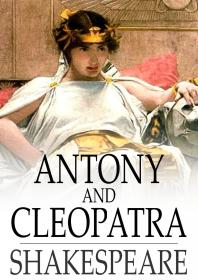 Antony and Cleopatra
by
William Shakespeare
Antony and Cleopatra is a tragic play by Shakespeare, which tells the ill-fated love story between Antony and Cleopatra and the antagonistic role played by Julius Caesar, future Emperor of Rome.
"I will tell you.The barge she sat in, like a burnish'd throne,Burn'd on the water: the poop was beaten gold;Purple the sails, and so perfumed thatThe winds were love-sick with them; the oars were silver,Which to the tune of flutes kept stroke, and madeThe water which they beat to follow faster,As amorous of their strokes."
Antony and Cleopatra
by
William Shakespeare
Antony and Cleopatra is a tragic play by Shakespeare, which tells the ill-fated love story between Antony and Cleopatra and the antagonistic role played by Julius Caesar, future Emperor of Rome.
"I will tell you.The barge she sat in, like a burnish'd throne,Burn'd on the water: the poop was beaten gold;Purple the sails, and so perfumed thatThe winds were love-sick with them; the oars were silver,Which to the tune of flutes kept stroke, and madeThe water which they beat to follow faster,As amorous of their strokes."
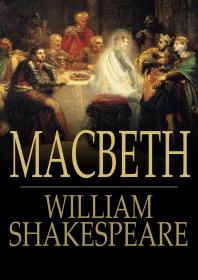 Macbeth
by
William Shakespeare
Macbeth is Shakespeare's shortest tragedy and one of his best-known plays. Often referred to as an archetypal tale, it warns against lust for power and the betrayal of friends. Shakespeare based the play loosely on a King Macbeth of Scotland. The play is traditionally considered "cursed", and thus many actors refer to it as "The Scottish Play" to avoid naming it.
Macbeth
by
William Shakespeare
Macbeth is Shakespeare's shortest tragedy and one of his best-known plays. Often referred to as an archetypal tale, it warns against lust for power and the betrayal of friends. Shakespeare based the play loosely on a King Macbeth of Scotland. The play is traditionally considered "cursed", and thus many actors refer to it as "The Scottish Play" to avoid naming it.
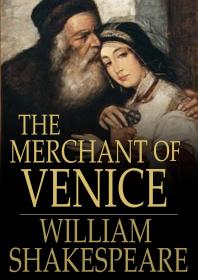 The Merchant of Venice
by
William Shakespeare
The Merchant of Venice is classed as one of Shakespeare's comedies, but is more often remembered for its dramatic characters and situations. Though the villain of the piece, the Jewish moneylender Shylock is often the most prominent and well-remembered character of the play. As he can be played and directed either sympathetically or wholly villainous, the play remains a highly contentious piece of theater.
The Merchant of Venice
by
William Shakespeare
The Merchant of Venice is classed as one of Shakespeare's comedies, but is more often remembered for its dramatic characters and situations. Though the villain of the piece, the Jewish moneylender Shylock is often the most prominent and well-remembered character of the play. As he can be played and directed either sympathetically or wholly villainous, the play remains a highly contentious piece of theater.
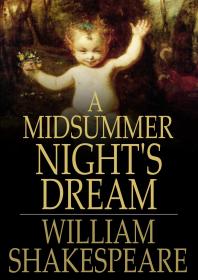 A Midsummer Night's Dream
by
William Shakespeare
Midsummer Night's Dream is Shakespeare's classic tale of two couples who can't quite pair up to everyone's satisfaction. Demetrius and Lysander love Hermia. Hermia loves Lysander but has been promised to Demetrius by her father. Hermia's best friend Helena loves Demetrius, but in his obsession for Hermia Demetrius barely even notices her smitten friend. When Hermia and Lysander plan to elope all four find themselves in the forest late at night where the fairy Puck and his lord Oberon wreck havoc on the humans with a love potion that causes the victim to fall in love with the first thing they see upon waking.
A Midsummer Night's Dream
by
William Shakespeare
Midsummer Night's Dream is Shakespeare's classic tale of two couples who can't quite pair up to everyone's satisfaction. Demetrius and Lysander love Hermia. Hermia loves Lysander but has been promised to Demetrius by her father. Hermia's best friend Helena loves Demetrius, but in his obsession for Hermia Demetrius barely even notices her smitten friend. When Hermia and Lysander plan to elope all four find themselves in the forest late at night where the fairy Puck and his lord Oberon wreck havoc on the humans with a love potion that causes the victim to fall in love with the first thing they see upon waking.
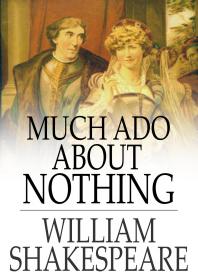 Much Ado about Nothing
by
William Shakespeare
Shakespeare's comedy play Much Ado About Nothing pivots around the impediments to love for young betrothed Hero and Claudio when Hero is falsely accused of infidelity and the "lover's trap" set for the arrogant and assured Benedick who has sworn of marriage and his gentle adversary Beatrice. The merry war between Benedick and Beatrice with the promptings of their friends soon dissolves into farcical love, while Hero's supposed infidelity is shown to be little more than "much ado about nothing".
Much Ado about Nothing
by
William Shakespeare
Shakespeare's comedy play Much Ado About Nothing pivots around the impediments to love for young betrothed Hero and Claudio when Hero is falsely accused of infidelity and the "lover's trap" set for the arrogant and assured Benedick who has sworn of marriage and his gentle adversary Beatrice. The merry war between Benedick and Beatrice with the promptings of their friends soon dissolves into farcical love, while Hero's supposed infidelity is shown to be little more than "much ado about nothing".
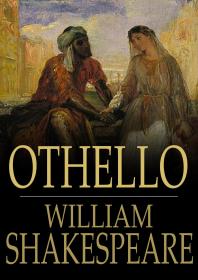 Othello
by
William Shakespeare
Othello, The Moor of Venice is a tragedy by William Shakespeare, believed to have been written in approximately 1603. The work revolves around four central characters: Othello, his wife Desdemona, his lieutenant Cassio, and his trusted advisor Iago. Attesting to its enduring popularity, the play appeared in 7 editions between 1622 and 1705. Because of its varied themes
Othello
by
William Shakespeare
Othello, The Moor of Venice is a tragedy by William Shakespeare, believed to have been written in approximately 1603. The work revolves around four central characters: Othello, his wife Desdemona, his lieutenant Cassio, and his trusted advisor Iago. Attesting to its enduring popularity, the play appeared in 7 editions between 1622 and 1705. Because of its varied themes
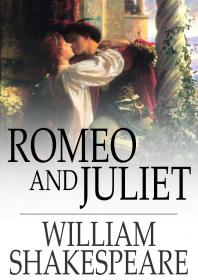 Romeo and Juliet
by
William Shakespeare
Romeo and Juliet is one of Shakespeare's early tragedies. The two young title characters fall madly in love, but are the children of feuding houses whose hatred for each other works to a devastating end. The play was immensely popular in Shakespeare's lifetime and is the most enduring of his plays along with Hamlet. Romeo and Juliet is considered one of the archetypal love stories.
Romeo and Juliet
by
William Shakespeare
Romeo and Juliet is one of Shakespeare's early tragedies. The two young title characters fall madly in love, but are the children of feuding houses whose hatred for each other works to a devastating end. The play was immensely popular in Shakespeare's lifetime and is the most enduring of his plays along with Hamlet. Romeo and Juliet is considered one of the archetypal love stories.
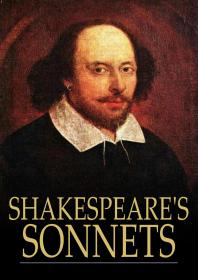 Shakespeare's Sonnets
by
William Shakespeare
The Sonnets compiles 154 Sonnets written by Shakespeare on all manner of themes from love and fidelity to politics and lineage. Many of the sonnets - in particular the first 17, commonly called the procreation sonnets - were commissioned, a fact which calls a simple, romantic reading into question.
Shakespeare's Sonnets
by
William Shakespeare
The Sonnets compiles 154 Sonnets written by Shakespeare on all manner of themes from love and fidelity to politics and lineage. Many of the sonnets - in particular the first 17, commonly called the procreation sonnets - were commissioned, a fact which calls a simple, romantic reading into question.
![]()
Go to OneSearch to search for more print books.
Want more on finding print books? Try our How to Use OneSearch guide.
 The Works of Christopher Marlowe
by
Christopher Marlowe
A single volume edition of the works of Christopher Marlowe. Edited by C F Tucker Brooke, American academic and author of various works to do with Shakespeare and his contemporaries. Christopher Marlowe was an English playwright, poet and translator of the Elizabethan era, considered the foremost Elizabethan tragedian of his day. Condition: In a cloth binging. Externally, smart with some light rubbing and bumping. Ink signature to front free-endpaper. Internally, firmly bound. Pages slightly age toned but generally bright and clean.
The Works of Christopher Marlowe
by
Christopher Marlowe
A single volume edition of the works of Christopher Marlowe. Edited by C F Tucker Brooke, American academic and author of various works to do with Shakespeare and his contemporaries. Christopher Marlowe was an English playwright, poet and translator of the Elizabethan era, considered the foremost Elizabethan tragedian of his day. Condition: In a cloth binging. Externally, smart with some light rubbing and bumping. Ink signature to front free-endpaper. Internally, firmly bound. Pages slightly age toned but generally bright and clean.
© 2024 COM Library
1200 Amburn Road, Texas City, Texas 77591
409-933-8448 . FAX 409-933-8030
This work is licensed under a Creative Commons Attribution-NonCommercial 4.0 International License